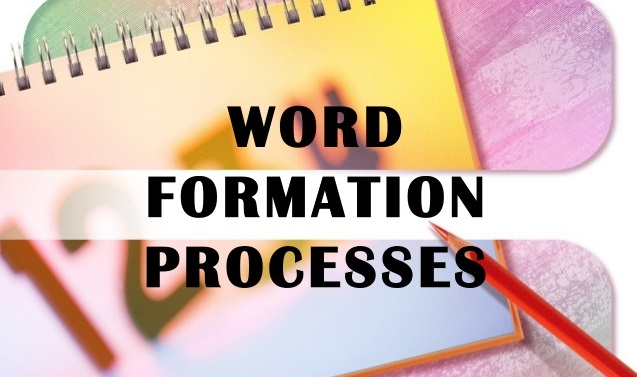Word Formation Processes
The processes of forming words can be grouped into two;
- Major word formation processes
- Minor word formation processes
MAJOR WORD FORMATION PROCESSES
Major word formation processes are commonly used in forming words. They include:-
- Affixation
- Compounding
- Conversion
MINOR WORD FORMATION PROCESSES
Major word classes are those which are not commonly used in forming words. They include:-
- Clipping
- Acronym
- Borrowing
- Blending
- Coining
- Neologism
- Onomatopoeia
CONVERSION (Zero Affixation)
Conversion is a word formation processwhere a word/base is converted into a new word class without changing its form.Examples;
NOUN to VERB
- Smile smile
Noun verb
I like your smile don’t smile
- Bank bank
Noun verb
CRDB is a commercial Bank I bank with Exim Bank
- Tax tax
Noun verb
We must pay tax We tax higher than Uganda
COMPOUNDING
Compounding is the process of word formation that involves joining of two or more separate words or bases to form a new word e.g. black + board = blackboard, class + room = classroom, chair + person = chairperson, head + master = headmaster etc.
TYPES OF COMPOUND WORDS/ WAYS OF WRITING COMPOUNDS
Solid compounds – In this type compound words are joined together e.g. Textbook, deadline, newsroom etc.
Open compounds – Compounds are written separately e.g. raw material, exercise book, school bus etc.
Hyphenated compounds – These are written with hyphens (- )e.g. long–term, book–keeping, map–reading, man–made etc.
Compounds can also be regarded as Opaque or Transparent
Opaque compounds are those compound wordswhose meaning is not found by looking the separate words i.e. the meaning is not cleare.g. deadline, sister-in-law, father-in-law etc.
Transparent compounds are those compounds whose meaning is the same with that of separate element (compound) i.e. the meaning is clear e.g. blackboard, newsroom, birthday etc.
AFFIXATION
Affixation is the process of forming words that involve an attachment of an affix to a root or stem. Affixation has three processes which are;
- Prefixation
- Infixation
- Suffixation
PREFIXATION
Preffixation is the process of putting an affix before the base form e.g. un+ true – untrue
dis+ like = dislike
TYPES OF PREFIXES
NEGATIVE PREFIXES
- DIS – It means not
it is added to Added toAdjectives,VerbsandNouns.
e.g. dislike, disobey, disconnect
(ii) UN – (the opposite of )
it is added to Adjectives and verbs
e.g. unhappy,unexpected, unfair and unkind
(iii) A – Means (lack of/in)
itisadded to Adjectives and Nouns
e.g. Assexual, amoral
(iv) NON – Added toAdjectives, Nouns and Verbs
- non – smoket, non – gradable, non – living things
- IN, IL, IM, and IRR- (NOT)
E.g. incorrect, illogical, impossible, and irregular
RESERVATIVE PREFIXES
(i) UN – (to reverse the action)
– itisadded to verbs
e.g. undo, unzip, untie
(ii) DE – ( to reverse theaction, to get rid of )
e.g. deforestation, decolonize, decode
PEJORATIVE PREFIXES
(i) MIS – It means wrong orastray)
it is added to verbs
e.g. mislead, misinform, misconduct
(ii) MAL – (bad, badly)
it is added to verbs
e.g. maltreat, malnutriotion, malfunction
(iii) PSEUDO ( It means false or imitation)
e.g. pseudo – scientific, pseudo – Christianity
DEGREE/SIZE PREFIXES
(i) ARCH – It means supreme, highest or arch
e.g. Arch bishop, Arch enemy, Arch fascist
(ii) it means above
e.g. supermarket, super power, supernatural.
(iii) OUT – It means to do something better
e.g. outline, outperform
(iv) OVER – It means too much
e.g. overgrazing, overconfidence, overfeeding
(v) UNDER – It means low quality
e.g. underfeeding, underperform
(vi) MICRO – It means something small.
e.g. micro-organism, micro-computer
(vii) MACRO- It means something big
e.g. macro – micro – organism, microcyte
ATTITUDE PREFIX
(i) CO- It means joint or accompany with
e.g. co-exist, co-operative, co-education
(ii) PRO-
e.g. proCCM, prosocialism, proCHADEMA, proactive.
(iii) ANTI- It means something against/ being against
e.g. antclockwise, antichrist, antisocial, antibiotic, antivirus.
TIME AND ORDER PREFIXES
(i) PRE-It means before
e.g. pre-form V, premock, premature
(ii) FORE- It means before.
e.g. foretell, foreshadow, fore father, foreleg
(iii) POST- It means after
e.g. post election, post independence, post war, post scool, post graduate
(iv) EX- It means former
e.g. ex-husband, ex-girlfriend, ex-soldiers
LOCATIVEPREFIXES
(i) INTER- It means between/among
e.g. International, interschool, intermarriage
(ii) TRANS- It means across
e.g. Trans Sahara, trans-Africa, trans continental.
(iii) SUPER-It means over or above
e.g. superstructure, superimpose
PREFIXES OF NUMBER
(i) UNI- MONO – (one)
e.g. unilateral, monocotyledon
(ii) BI- DI- (Two)
e.g. Diphthong, bilingual, bicycle
(iii) TRI- (Three)
e.g. triangle, tricycle, trinity
- AUTO- (Self) e.g. automatic, autocratic
NEO – (New) neo-colonialism
PAN- (All, world-wide) e.g. Pan African, Pan American
PROTO- (First, original) e.g. prototype, protobantu
SEMI- (half) e.g. semi circle, semi final
VICE– (Deduty) e.g. vice president
SUFFIXATION
Is a process of putting a morpheme after the base
- suffix is an element of structure that is added after a base.
- most of the suffixes are usually derivatives i.e. they change the word clss
TYPES OF SUFFIXES
NOUN SUFFIXES
- occupational Suffixes
- –ster e.g. gangster
- –eer e.g. engineer, racketeer
- Diminutive suffixes
- –let (small, unimportant) e.g. booklet, piglet
- –ette ( small, compact) e.g. kitchenette
- Status, domain Suffixes
- –hood (status) e.g. childhood, adulthood, widowhood.
- –ship (status, condition) e.g. leadership, dictatorship, friendship
- –dom (domain, status) kingdom, chiefdom
- –ocracy (system of government) e.g. democracy, autocracy
NOUN /ADJECTIVES
- –an ( belonging to, pertaining to)
added to proper noun – e.g. Tanzanian, republican, Indian.
- –ese (means nationality when added to proper noun)
e.g. Japanese, Congolese, Chinese
(iii) –ist (member of a party, occupation)
e.g. capitalist, racialist, stylist
(iv) –ite (it is added to names to form personal nouns or adjectives)
e.g. Israel – Israelite, Stalin – Stalinite
(v) –ism ( means doctrine, a point of view or political movement)
e.g. socialism, capitalism, Nyerereism
VERB TO NOUN SUFFIXES
- –er (it means profession)
e.g. work + er = worker
teach + er = teacher
drive+ er = driver
- –ant
e.g. account + ant = accountant
inform + ant = informant
- –ee ( one who receives something)
e.g. employee, payee, trainee
(iv) – ation( state, action, institution)
e.g. organization, civilization, victimization
(v) –ment (state, action)
e.g. enjoyment, entertainment, development
(vi)-age (extent, amount)
e.g. coverage, westage
(vii) –al
e.g. refusal, dismissal.
ADJECTIVE TO NOUN SUFFIXES
- –ness (state, quality)
e.g. sane + ity =sanity
rapid + ity = rapidity
elastic + ity = elasticity
- VERB SUFFIXES
added to nouns or adjectives to form transitive verbs
- –ify (causative)
e.g. beauty + ify = beautify
amplify + ify = amplify
- –ise (causative)
e.g. modern + ise = modernise
legal + ise = legalise
- –en (to make more – causative)
e.g. wide + en = widen
sharp + en = sharpen
NOUN TO ADJECTIVE SUFFIXES
- ful (fuu of ; having)
e.g. hope + ful = hopeful
help +ful =helpful
joy+ joyful
- –ly (having the qualities of)
e.g. man – manly, friend – friendly, beast – beastly
(iii) –less ( without, not having)
e.g. tooth – toothless, child – childless, care – careless
(iv) –ish (belonging to, having the character of)
e.g. turk – Turkish, Sweden – Swedish, child – childish
(v) –able e.g. favour – favourable, comfort – comfortable
(vi) –y (like, full of; covered with)
e.g. sand – sandy, hair – hairy
ADVERB SUFFIXES
- –ly ( manner)
e.g. kind – kindly,
(ii) –ward(s) (manner and direction of movement)
added to preposition, adverbs, nouns etc)
e.g. on – onwards, south – southwards
(iii) –wise (in the manner of, as far as; etc)
added to nouns to form adverbs of manner, viewpoint etc
e.g. clock – clockwise, education wise
INFIXATION
Refers to insertion of an affix into the root or stem
there is no infixation process in English word formation
MINOR WORD FORMATION PROCESSES
CLIPPING
Is the process of forming words by removing one or more syllables from a word.
clipping may occur at:-
- the beginning – e.g. phone – telephone, plane – airplane
- the end of a word– e.g. ad – adverstment, taxi – taxcab, mic – microphone, pub – public
- both ends of a word – e.g. flu – influenze, fridge – refridgerator
ACRONYM
Is the process of forming words by taking initial letters of words in phrase, sentence or names.
There are two types of acronyms:-
- those pronounced as sequences of letters ( initialization)
initialization may be:-
- the letters representing full words
e..g. UN – United Nations
CCM – Chama Cha Mapinduzi
EAC – East African Community
- the letters representing elements in a compound or just parts of word
TV – Television
TB – Tuberculosis
GHQ – General Headquarters
- those pronounced as words.
VETA – Vocational Education Training Authority
MOI – Muhimbili Orthopedic Institute
NATO – ( the North Atlantic Treaty Organisation)
RADAR – Radio Detecting and Ranging)
BLENDING
Is the process of forming words by fragmenting elements of two bases and join (blend) them together
e.g. Brunch – breakfast + lunch
telecast – television + broadcast
mobitel – mobile telephone
flush – flash + gush
medicare – medical care
motel – motor +hotel
smog – smoke fog
interpole – international + police
transistor – transfer + resister
BORROWING
It refers to the process of forming words by taking a word from one language and incorporating it into another
Examples of English wordsborrowed from other languages include:-
alcohol ( Arabic), boxer and ozone (from German), piano (Italian), boss (Dutch) zebra (Bantu).
others include;
safari (Kiswahili)
judo, karate, tycoon (Japanese)
boutique, crusade (French)
pistol, polka, robot ( from Czech Republic)
cookie, lottery, boss, yatch (from Netherland and Belgium)
kangaroo (Australia)
amen, messiah, gauze ( from Israel)
REDUPLICATION
It refers to the process of forming words through repetition of the same or almost the same sounds.
OR
This is the process of forming new words by doubling an entire word (total reduplication) or part of a word (partial reduplication).
examples;
criss – cross, ding- dong, no – no, goody- goody, see – saw, tip – top, pooh – pooh, splish – splash, super – duper, ha – ha, zig – zag
NOTE: Reduplicatives are mostly informally.
uses of reduplicatives
- To imitate sound e.g.ding – dong ( the sound of a bell), ha – ha (laughter), tick – tock (clock) bo
- To intensify e.g. tip – top
- to suggest alternative movement e.g. see – saw, zig – zag
COINING/COINAGE
It refers to the process of forming words through invention of new terms.
- thenewly invented term is called eponym.
- examples
aspirin, Kodak, nylon, sandwich, Orlon
NEOLOGISM (SEMANTIC LOAN)
It refers to the extension of the meaning of a word to include new, foreign meanings. for example the word “tick” its meaning has been extended semantically to mean an “exploiter”
ONOMATOPOEIA
The creation of words that imitate natural sounds like the bird’s name cuckoo or pikipiki (motorcycle) and nyau (cat) in Kiswahili
BACK FORMATION
Is the morphological process in which new words are are reversed from the words which existed earlier
e.g. the noun Television first into use then the verb Televise was created from it. Baby-sit has been created from the earlier noun Baby-sitter
OR
It is a process which involves reduction. a word of one type (normally a noun) is reduced to form another word of different type (usually verb)
e.g. – Televisin – televise
editor – edit
donation – donate
emotion – emote
SYMBOLISM
This is a process which involves the change of the structure of a word.
e.g. man – men
foot – feet
- the changes may be in:-
- vowels
e.g. goose – geese
woman – women
- consonants
build – built
has – had
- the whole structure
e.g. go – went
buy – bought
Join Our Telegram Group for Daily Updates CLICK HERE































































Really informative blog post.Much thanks again. Want more.